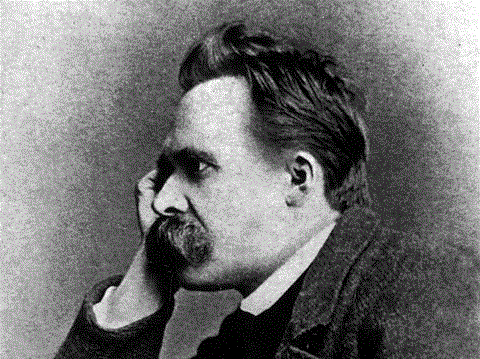
A philosopher perhaps more widely known for his prodigious mustache than for the varieties of his thought, Friedrich Nietzsche often seems to be misread more than read. Even someone like Michel Foucault could gloss over a crucial fact about Nietzsche’s body of work: Foucault remarked in an unpublished interview that Nietzsche’s “wonderful ideas” were “used by the Nazi Party.” But that use, he neglected to mention, came about through a scheme hatched by Nietzsche’s sister, after his mental collapse and death, to edit, change, and otherwise manipulate the thinker’s work in a way The Telegraph deemed “criminal.” Foucault may not have known the full context, but Nietzsche had about as much sympathy for fascism as he did for Christianity–both reasons for his break with composer Richard Wagner.
What Nietzsche loved most was music. Even in the wake of this scandal, with Nietzsche fully rehabilitated at the scholarly level at least, the philosopher is generally read piecemeal, used to prop up some ideology or critical theory or another, a tendency his anti-systematic, aphoristic work inspires. A more holistic approach yields two important general observations: Nietzsche found the mundane work of politics and nationalist conquest, with its tribalism and moral pretensions, thoroughly distasteful. Instead, he considered the creative work of artists, writers, and musicians, as well as scientists, of paramount importance.
Nietzsche almost entered medicine and was himself an artist: “before he engaged himself fully as a philosopher, he had already created a substantial output as poet and composer,” writes Albany Records. In an 1887 letter written three years before his death, Nietzsche claimed, “There has never been a philosopher who has been in essence a musician to such an extent as I am,” though he also admitted he “might be a thoroughly unsuccessful musician.” In any case, he hoped that at least some of his compositions would become known and heard as complementary to his philosophical project.
Now serious readers of Nietzsche, or those simply curious about his musicianship, can hear most of those compositions in a Spotify playlist above. Performed by Canadian musicians Lauretta Altman, Wolfgang Bottenberg, and the Montreal Orpheus Singers, the music ranges from sprightly to pensive, romantic to mournful, and some of it seems to come right out of the Protestant hymnals he grew up with as the son of a Lutheran minister. Nietzsche composed music throughout his life—a complete chronology spans the years 1854, when he was only ten, to 1887. See The Nietzsche Channel for a thorough list of published Nietzsche recordings and sheet music. To listen to the music here, you will need to download and register for Spotify.
Related Content:
130+ Free Online Philosophy Courses
The Philosophy of Nietzsche: An Introduction by Alain de Botton
The Digital Nietzsche: Download Nietzsche’s Major Works as Free eBooks
Josh Jones is a writer and musician based in Durham, NC. Follow him at @jdmagness


What can i say … this is mere bliss to me , that is * i never knew he’d written such amazing compositions thank you for sharing , inspiring ‚by all means
A través de la música es como se entiende mejor la disputa “interior” que tiene con Wagner, éste, al contrario de Nietzsche, más músico que filósofo… mientras Wagner tiene la fuerza de un vendaval, Nietzsche tiene la poesía…mientras el uno me impacta con sus luces, el otro me hace volar por alucinantes laberintos y luego viceversa…
¿Could you please argument on this statement “Foucault may not have known the full context, but Nietzsche had about as much sympathy for fascism as he did for Christianity”?
Yeah, gee I wonder if Foucault did any research on this random Nietzsche guy?
Foucault’s entire epistemology was overwhelmingly influenced by Nietzschean philosophy. Nietzsche was the one that theorized genealogy as method, Foucault just applied and developed it. So, yes, I am guessing he knew the context of his work…
Some 20 years ago, I wrote a criticism about a Nietzsche’s compositions concert in Goethe Institute. And sice I had the month already two articles in Harmonie, they denied me to publish this one, which would be the 3rd.
Have, please, compassion with this post-term pregnancy of mine…
I considered his musik alike of the compositions of Clara Schumann and I called it, in my venacular:
“Skladatel Friedrich Nietzsche
bez kladiva a biče”
which is not far from the possibility to express it in English, or I will try in German, too:
“Komponist FN:
ohne Hammer und Peitsche.”
yes
Can we please have a more open alternative? Like YouTube or direct links to .ogg files, instead of Spotify?
“In an 1887 letter written three years before his death…” The author should have written “before his mental breakdown.” Nietzsche died in 1900.